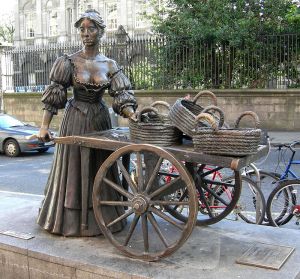Hello,
I’m not entirely sure how I got onto the topic (possibly thanks to a visit to Sheridan’s Cheese mongers in Carnaross) but I found myself trying to explain what a monger was to my offspring this week, and failing. I mean, does a monger merely sell a product and, if so, what is a coster monger selling? If a fish monger sells fish, then why isn’t a butcher called a meat monger? Plus, I think I prefer cheese-wrangler as a term – like an animal wrangler on a movie set. I have a mental image of a woman in an apron wielding a cheese slicer and herding naughty rounds of brie and stilton into their paddocks.
So I had a look around the dictionaries and discovered that the term monger (pronounced to rhyme with hunger) denotes somebody who peddles or deals in a commodity for example an ale monger sells beer. Mongering is also a verb (dating from 12th century) and the combined form as a noun denoting a seller of something dates from the 1860s. Its origins lie in Greek, via Latin and Old English, and relate to charming somebody, which I suppose is part of the charisma of a good monger.
A monger in 1790 was also a small merchant vessel, a sea ship presumably used by small traders or mongers.
I then had a look around some of the more common mongers. Fish mongers sell fish, of course. An iron monger sells hardware items like tools and household implements. A coster monger sells items, especially fruit and vegetables, from a handcart in the street.
Molly Malone (of Dublin fame) was a coster monger selling cockles and mussels and her fellow coster mongers can still be found today on Moore Street in Dublin selling vegetables and fruit. Why coster? A costard was a cooking apple.
Mongering can have negative connotations too. You’ll find warmongering, gossip-mongering and scaremongering rife in the world. But I will stick to frequenting the cheese mongers.
Until next week happy reading, writing, and wordfooling,
Grace

